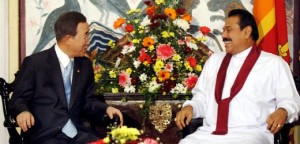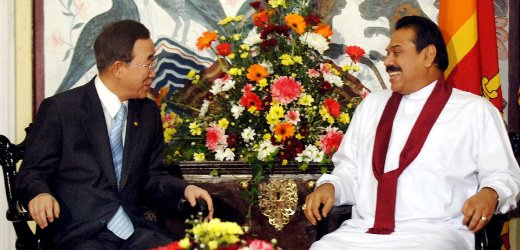 |
| Ban meeting Rajapaksha in May 2009 |
Colum Lynch
Ban Ki-moon added his voice today to the rising chorus of world leaders denouncing Syrian President Bashar al-Assad’s brutal repression of civilians and his failure to listen to his people’s demands for democratic change.
“I am gravely concerned about Syria,” Ban said in speech this afternoon at Yale University. “Each day in Syria brings new reports of appalling violations of human rights and tragic suffering.”
Throughout the Arab Spring, Ban’s outspoken criticism of Syria and other long-ruling Arab despots has helped to recast the former South Korean foreign minister — who had been criticized by human rights advocates during his first term as being too soft on despots — as a champion of human rights and democracy.
But it is his response to the final, bloody months of Sri Lanka’s decades-long civil war — a human rights calamity that has largely fallen below the radar of most global policymakers — that may ultimately do more to shape his legacy, and that of the United Nations, as a defender of human rights.
An internal U.N. probe into the U.N.’s response to the crisis in Sri Lanka concluded that the United Nations had failed to fulfill its obligations to protect civilians in Sri Lanka, where as many as 40,000 civilians were killed in the final five months of the conflict that ended in May 2009, according to a draft summary that was leaked to the BBC.
“Events in Sri Lanka mark a grave failure of the UN,” the report concluded.
Sri Lanka’s 26-year-long civil war pitted the country’s ruling Sinhalese majority against the separatist Liberation Tigers of Tamil Eelam (LTTE), a ruthless insurgency that assassinated an Indian prime minister, Rajiv Gandhi, and introduced the practice of suicide bombings.
The Sri Lankan government launched an all-out offensive in late 2008 in an effort to crush the LTTE. The operation, which centered on a Tamil stronghold in the northern Vanni region of Sri Lanka, succeeded in wiping out the armed movement in May 2009. But the operation took a devastating toll on ethnic Tamil civilians, who were largely trapped between the rival forces. Most of the victims died of indiscriminate shelling by Sri Lankan military forces.
A U.N. panel, set up by Ban, concluded in April 2011 that both the Sri Lankan government and the LTTE committed massive human rights violations.
The panel recommended that Ban set up an “independent international mechanism” to carry out a more thorough probe into “credible” allegations of war crimes and crimes against humanity by the Sri Lankan government and the LTTE, which held more than 300,000 civilians “hostage” to enforce a “strategic human buffer between themselves and the advancing Sri Lankan army.”
But the panel also faulted the United Nations for failing “to take actions that might have protected civilians” and called on Ban to conduct a “comprehensive review” of the U.N. system’s response to the crisis.
The U.N. chief has never authorized an independent investigation, arguing that only an intergovernmental organization like the U.N. Security Council or the Human Rights Council has the power to do it. (That hasn’t happened).
But Ban did set up the panel to review the U.N.’s conduct in Sri Lanka.
Ban’s spokesman, Martin Nesirky, said that the U.N. chief would meet with the panel’s chief author, Charles Petrie, on Wednesday morning and would release the report soon after.
But he declined to comment on the contents of the leaked report in a press briefing today. “We don’t comment on leaked documents,” he said. “The secretary general will be receiving the report of the Internal Review Panel this week. When he does receive it and has read it, it will be made public.”
The Petrie report points to a “systemic failure” in the U.N. response to the crisis, and criticized the organization for withdrawing personnel from the conflict zone in September 2008, on the grounds that the Sri Lankan government could not longer guarantee their safety, according to the BBC, which published quotes from the confidential report.
The report also faults “many senior UN staff” who “did not perceive the prevention of killing of civilians as their responsibility — and agency and department heads at UNHQ were not instructing them otherwise.” There was, according to the report, “a sustained and institutional reluctance [by U.N. personnel in Sri Lanka] to stand up for the rights of people they were mandated to assist.”
Steven R. Ratner, a professor at University of Michigan’s Law school who served on Ban’s first panel, said the reports of the latest findings are consistent with what his teams’ own investigations.
But he said he the more serious failure is that the Sri Lanka’s have never conducted a credible investigation into the crimes.
“The U.N. failed, but the Sri Lankan government ultimately most responsible,” Ratner told Turtle Bay. “They are the ones who have not begun a bona fides accountability process.”
Ratner said that the conduct of the Sri Lankan government, and the failure of the outside world to prevent atrocities, has given a “black eye” to the newly emerging Responsibility to Protect (R2P) doctrine, which was adopted at the United Nations by world leaders in 2005.
“You had a crisis that unfolded before the eyes of the United Nations and the major powers and no action was taken,” he said. “Everything was done in a very quiet way. I think it’s a terrible defeat and setback for the whole commitment to R2P.”
It remains unclear what action, if any, the U.N. will take in response to the report. It will never be possible to assess Ban’s record on human rights without taking a hard look at what the U.N. did, or more importantly, didn’t do in Sri Lanka.
